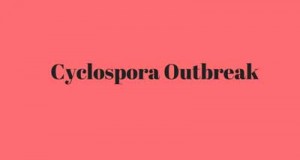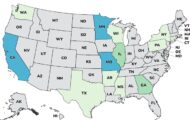At least a few of the 610 people in 22 states who have been diagnosed with cyclosporiasis, the infection caused by the rare parasite Cyclospora, are food handlers. And the Centers for Disease Control and Prevention (CDC) has some advice for them: if you have diarrhea, don’t go to work. This advice applies to food handlers at all times, but is worth repeating as case counts climb.
 By state the 610 cases reported so far are as follows: Texas (258), Iowa (156), Nebraska (86), Florida (31) Wisconsin (16), Illinois (11), Arkansas (10), New York City (7), Georgia (5), Missouri (5), Kansas (4), Louisiana (3), New Jersey (3), Connecticut (2), Minnesota (2), New York (2), Ohio (2), Virginia (2), California (1), New Hampshire (1), South Dakota (1), Tennessee (1), and Wyoming (1). At least 43 people have been hospitalized.
By state the 610 cases reported so far are as follows: Texas (258), Iowa (156), Nebraska (86), Florida (31) Wisconsin (16), Illinois (11), Arkansas (10), New York City (7), Georgia (5), Missouri (5), Kansas (4), Louisiana (3), New Jersey (3), Connecticut (2), Minnesota (2), New York (2), Ohio (2), Virginia (2), California (1), New Hampshire (1), South Dakota (1), Tennessee (1), and Wyoming (1). At least 43 people have been hospitalized.
Direct person to person transmission or transmission via ingestion of newly contaminated food or water is unlikely. But those infected can make others sick by contaminating food or food preparation areas. People with cyclosporiasis shed immature Cyclospora oocysts in their feces that an non-infective. These oocysts become infective in the environment in about a week’s time.
Cyclospora is difficult to grow in a lab environment, according to the CDC’s Cyclospora expert Dr. Barabra Herwaldt. So there are some things about the parasite that are unknown including the minimum time required for sporulation, how environmental conditions effect the rate of sporulation and the survival rate oocysts.
What is known is that Cyclospoar can cause illness lasting up to two months. Symptoms include persistant bouts of explosive diarrhea, nausea, loss of appetite and weight loss. If you have these symtoms talk with your doctor about Cyclospora.




